George W. Bush doesn't hesitate to acknowledge that his faith plays a role in his decision-making -- he's been called the most overtly religious president since Jimmy Carter. But because Bush presides over a nation founded on the principle of separation between church and state, his overt religiosity has made the question of how much political influence religion should have even more pertinent.
Political Influence
So, how much influence should the church or organized religion have? Americans are about evenly divided on whether the church or organized religion has too little or too much political influence, with roughly half (48%) saying too much political influence and the other half saying either too little (40%) or volunteering that it has the right amount (7%) of political influence*. This represents a slight shift in favor of saying it is too influential, when compared with data from 1996. At that time, 42% thought the church had too much influence, 44% too little, and 8% the right amount.
Comments on the subject from Â鶹´«Ã½AV survey respondents illustrate the range of opinion on this issue. "This country was founded on Judeo-Christian beliefs. Separation of church and state doesn't mean you take God out of everything," says a 63-year-old man from Ohio. But a 25-year-old female respondent from Wisconsin says she's a strong believer in the separation of church and state. "I think they should really be separate."
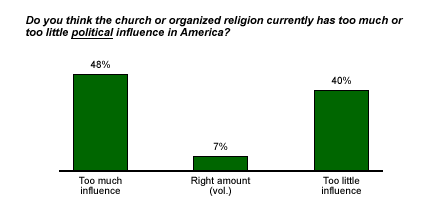
Democrats and Republicans have different views about how much religion should influence politics. The majority of Democrats (67%) say there is too much religious influence, compared with 28% of Republicans. The majority of Republicans (55%) say there is too little, while only a quarter of Democrats (25%) would agree. The respondent from Ohio, who is a Republican, says the church should have every right to influence politics. "Christians have as much right to speak out as atheists do -- the same freedoms apply to everyone," he says.
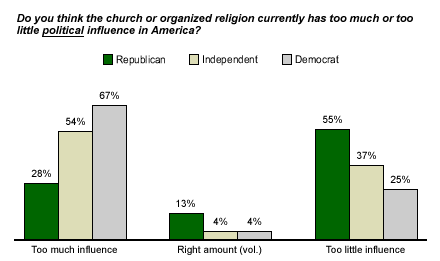
Similar differences of opinion exist between Americans who attend church or synagogue every week and those who seldom or never attend. Fifty-seven percent of weekly attendees say church or organized religion has too little political influence, while only 24% of people who seldom or never attend religious services say it has too little.
"I don't think churches should be promoting candidates in any way, nor should they be mandating federal policy about issues related to religion -- like school prayer," says the respondent from Wisconsin, who attends religious services about once a month and feels the church has too much political influence. "Politicians need to respect different viewpoints and understand that people feel differently about things." Contrast that statement with one from a 57-year-old Texas woman who attends church weekly and thinks it needs to be more influential politically. "The majority of Americans believe in God," she says, "but government is taking God out of public schools and out of public places."
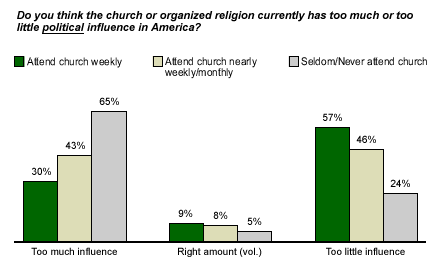
The Religious Gender Gap
Women, more often than men, say the church or organized religion should have more influence on politics and morality. Forty-six percent of women think the church has too little political influence in America, compared with 34% of men. Â鶹´«Ã½AV surveys have found historically that women are more likely than men to attend church and to report that religion is very important in their lives. "Churches need to attract more people to religious life and be more vocal about instilling good values," says the Wisconsin respondent.
Moral Influence
By contrast, it's worth noting that Americans are much less divided about organized religion's influence on morality in this country. Most see moral behavior as the church's domain, and 64% agree the church or organized religion has too little moral influence in America. Just 27% say the church has too much influence on morals, and 6% believe it has the right amount. These numbers also show slight movement in the direction of saying religion is too influential in this domain. In 1996, 21% of Americans said the church had too much influence on morality, 69% too little, and 8% the right amount.
"Morality is organized religion's job," says a 45-year-old respondent from Minnesota. "The church should not dictate behavior, but people really need guidance."
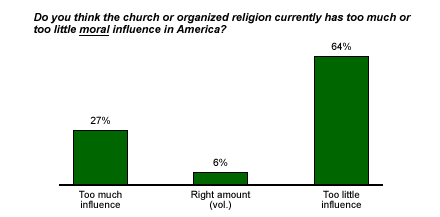
More Republicans attend church on a weekly basis than Democrats or independents, so it's not surprising that 81% of Republicans say organized religion has too little moral influence in American life. But slight majorities of Democrats (54%) and independents (56%) also agree that the church should have more influence over morality in this country. "The church should take a stronger stand, and especially try to reach the younger generation," suggests the respondent from Texas, who is a Democrat.
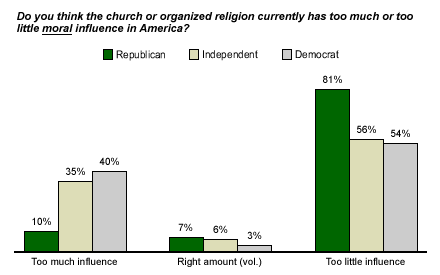
*Results are based on telephone interviews with 1,015 national adults, aged 18 and older, conducted Nov. 19-21, 2004. For results based on the total sample of national adults, one can say with 95% confidence that the maximum margin of sampling error is ±3 percentage points.
